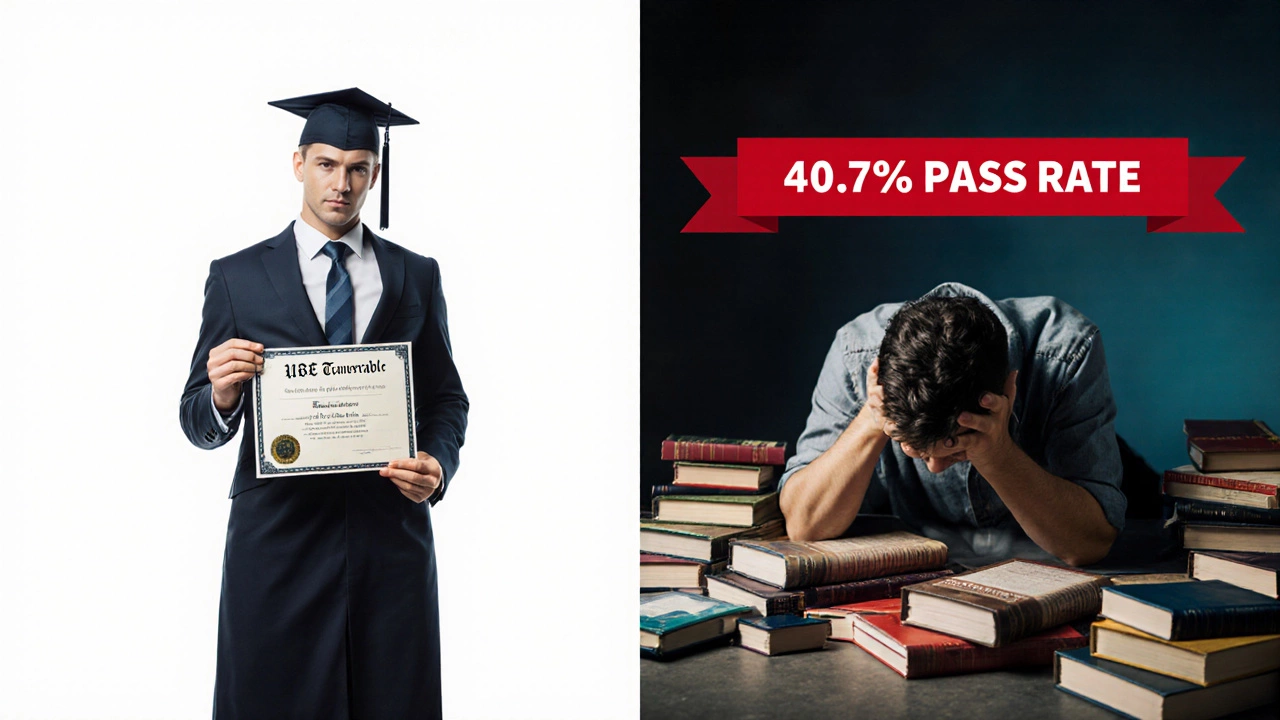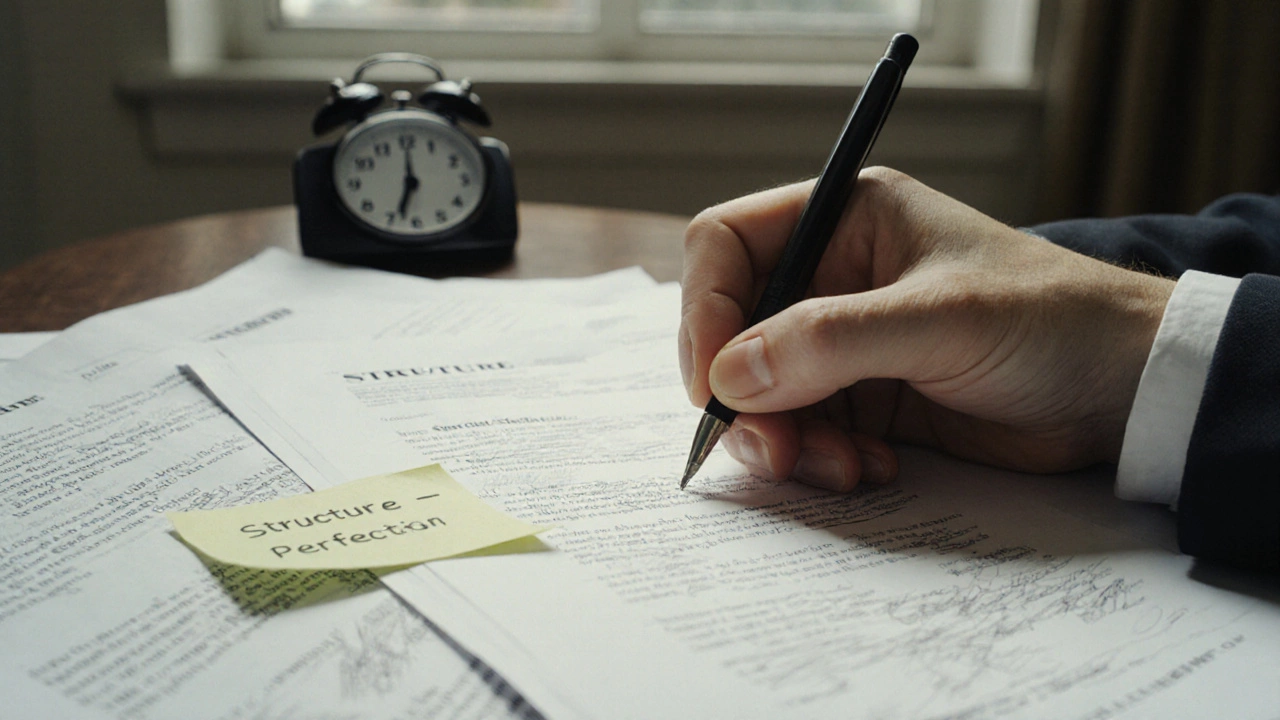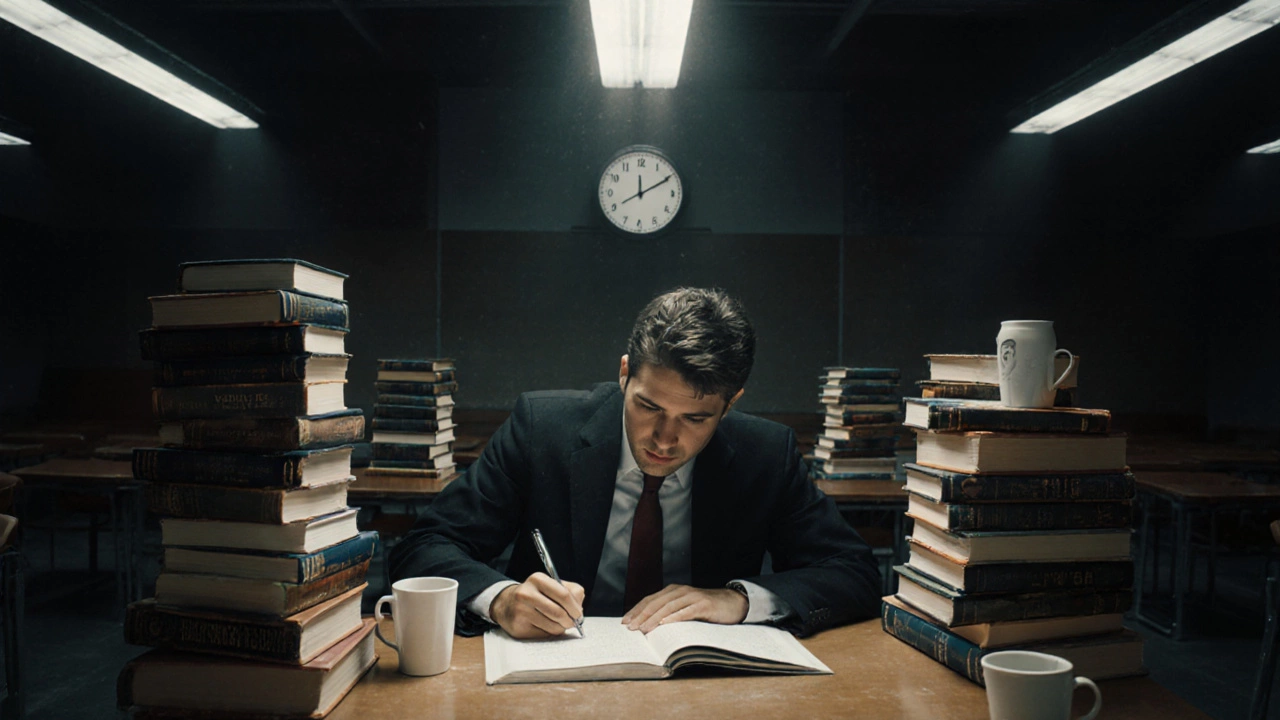California Bar Exam Calculator
Pass Rate Calculator
California requires 1390 points out of 2000 to pass. The Multistate Bar Exam (MBE) is worth up to 200 points. Enter your estimated MBE score to calculate how many points you need from the essay and performance tests.
Your Results
Total points needed to pass: 1390
Points from MBE: 0
Points needed from essays & performance tests: 1390
Average score needed on essays: 0
Note: Essays are worth up to 600 points total (300 points each for Day 1 and Day 3)
Estimated Costs
Every year, over 30,000 people take the bar exam in the United States. Most pass. But one state makes it harder than any other - and it’s not because of the laws. It’s because of the exam itself. If you want to know which state is the toughest to become a lawyer, the answer isn’t New York, Texas, or even Illinois. It’s California.
Why California’s Bar Exam Is the Hardest
California’s bar exam has the lowest pass rate in the country. In 2024, only 40.7% of first-time takers passed. That’s less than half. Compare that to New York, where 77% passed, or Florida, at 69%. Even states like Alabama and Iowa, known for being less crowded, had pass rates above 70%.
Why such a big gap? It’s not just about how many questions you get right. It’s about what’s on the test.
California tests more subjects than any other state. While most states stick to the 14 subjects covered by the Uniform Bar Exam (UBE), California adds at least 10 more. You’ll be tested on California-specific laws in civil procedure, community property, professional responsibility, and even trusts and wills - all in addition to federal law. There’s no way to study just the common law and expect to pass.
The Three-Day Grind
The exam isn’t just longer - it’s brutal in structure. It runs over three days:
- Day 1: Five essay questions on California law - including torts, contracts, criminal law, and evidence - plus one performance test where you actually draft a legal memo or brief.
- Day 2: The Multistate Bar Exam (MBE), a 200-question multiple-choice section covering six areas of federal law. This part is shared with other UBE states, but here it’s weighted differently.
- Day 3: Five more essays, this time on constitutional law, business law, and evidence, plus another performance test. No breaks between sections. No time to breathe.
Most states give you two days. California gives you three - and expects you to write hundreds of pages in total. You’re not just memorizing rules. You’re being asked to apply them in real-world scenarios under extreme pressure.
The Performance Test: Where Most Fail
One of the most feared parts of the exam is the performance test. You’re given a file with mock client documents, court filings, statutes, and case law. Then you have 90 minutes to write a legal brief, memo, or contract - just like a real lawyer would.
It’s not about knowing the law. It’s about organizing it. About spotting issues. About writing clearly under time pressure. Many candidates who aced the multiple-choice section still fail because they can’t structure a memo in 90 minutes. That’s not a knowledge problem. It’s a skill problem.
And here’s the kicker: California doesn’t release sample answers. You don’t know what a passing answer looks like. You’re guessing at the standard.
Pass Rates Don’t Tell the Whole Story
Some people say, “Well, if you study hard, you’ll pass.” But the data says otherwise. In 2023, 87% of graduates from ABA-approved law schools in California passed. That sounds good - until you look at the numbers for non-ABA schools. For graduates of unaccredited California law schools, the pass rate dropped to 18%. That’s not a failure of intelligence. It’s a failure of preparation.
California doesn’t just test legal knowledge. It tests access. If you went to a lesser-known law school, you’re less likely to have the resources, coaching, or practice exams that top-tier schools provide. The system doesn’t make it impossible - it makes it unequal.

How Other States Compare
Let’s put California in context:
| State | Pass Rate | Exam Length | Unique Requirements |
|---|---|---|---|
| California | 40.7% | 3 days | 24+ subjects, 2 performance tests |
| New York | 77% | 2 days | UBE + NY law |
| Florida | 69% | 2 days | Constitutional law essay |
| Texas | 75% | 2 days | Multiple-choice only on state law |
| Illinois | 71% | 2 days | UBE + ethics exam |
| Alabama | 78% | 2 days | Minimal state-specific content |
Notice something? Every other state on this list uses the Uniform Bar Exam (UBE), which is standardized across 40+ jurisdictions. You take it once, and you can transfer your score to another UBE state. California doesn’t play along. It demands its own version - and it’s the only one that still uses its own essay format.
What Makes It So Hard - Really?
It’s not just the length. It’s the lack of predictability. You can’t find a reliable set of past essays to study. The California Bar Exam doesn’t release them. That means you’re studying blind.
It’s the grading. California uses a “curve” that’s not publicly explained. You don’t know if you got 65% right - you just know whether you passed or failed. And the passing score? 1390 out of 2000. That’s higher than any other state.
It’s the cost. The exam fee is $950. If you fail, you pay it again. Most people don’t pass on the first try. The average candidate takes it twice. That’s nearly $2,000 just to sit for the test - not counting prep courses, books, or lost income.
Who Still Passes - And How?
People who pass California’s bar exam don’t just study harder. They study smarter.
- They use California-specific prep courses - not generic bar prep tools.
- They do 10+ full-length practice essays under timed conditions.
- They get feedback from licensed attorneys, not just online forums.
- They know the grading rubric: structure matters more than perfect legal analysis.
One former test-taker told me: “I failed twice. On the third try, I stopped trying to be perfect. I started trying to be clear. I wrote like I was explaining it to a client - not a professor. That’s when I passed.”

Is It Worth It?
If you’re aiming to practice law in California - yes. It’s the third-largest legal market in the U.S. After New York and Texas, California has more lawyers, more firms, and more high-profile cases.
But if you’re just looking to become a lawyer? Consider this: you can pass the UBE in a state like Colorado or New Mexico, then apply for reciprocity in California. It’s harder, but not impossible. Some lawyers do it that way.
Still, if you’re serious about practicing in California, you have to accept the challenge. There’s no shortcut. No easy path. Just hard work, discipline, and a willingness to be tested more than anyone else in the country.
What If You Don’t Pass?
Failure isn’t the end. It’s a signal.
Most people who fail California’s bar exam don’t fail because they’re dumb. They fail because they didn’t practice the right way. They studied topics they didn’t need. They skipped the performance tests. They didn’t time themselves. They trusted free YouTube videos over structured prep.
Re-takers who pass usually make three changes:
- They hire a California bar tutor - not a national one.
- They redo every past performance test they can find (even unofficial ones).
- They write at least 20 full essays before the next exam.
And they stop thinking of it as a test. They start thinking of it as a job interview - where the job is being a lawyer.
Is California’s bar exam the hardest in the world?
Yes, among U.S. states, California has the lowest pass rate and the most demanding structure. Globally, countries like Japan and South Korea have bar exams with even lower pass rates, but they’re structured differently - often with multiple rounds and language barriers. In the U.S., California stands alone in its combination of volume, unpredictability, and grading opacity.
Can I take the California bar exam if I went to law school outside the U.S.?
Yes, but it’s harder. Foreign-educated lawyers must get their degrees evaluated by the State Bar of California and prove they’ve studied enough U.S. law. Most need to complete additional coursework or attend an ABA-approved law school for at least one year. The exam itself is the same - but the prep is longer and more expensive.
Do I need to live in California to take the bar?
No. You can take the exam from anywhere in the U.S. or even abroad - as long as you meet the eligibility requirements. But you’ll need to plan ahead. The exam is only offered twice a year, in July and February, and test centers are limited.
Why doesn’t California use the Uniform Bar Exam (UBE)?
California’s bar association believes the state’s unique legal landscape - especially in areas like community property, consumer protection, and employment law - requires its own test. They argue that UBE doesn’t cover enough California-specific law. Critics say it’s outdated and creates unnecessary barriers. But the system hasn’t changed since the 1980s.
What’s the easiest way to become a lawyer in the U.S.?
The easiest path is to graduate from an ABA-approved law school, then take the UBE in a state with a high pass rate - like Colorado, Montana, or New Mexico. You can often transfer your score to other UBE states later. California is the opposite: high barrier, no reciprocity, and no safety net.
Final Thought
Becoming a lawyer in California isn’t about being the smartest. It’s about being the most prepared. It’s about showing up with more practice, more discipline, and more grit than anyone else. If you can pass it, you can handle anything the legal world throws at you. But if you’re not ready to fight for every point - you might not make it.
